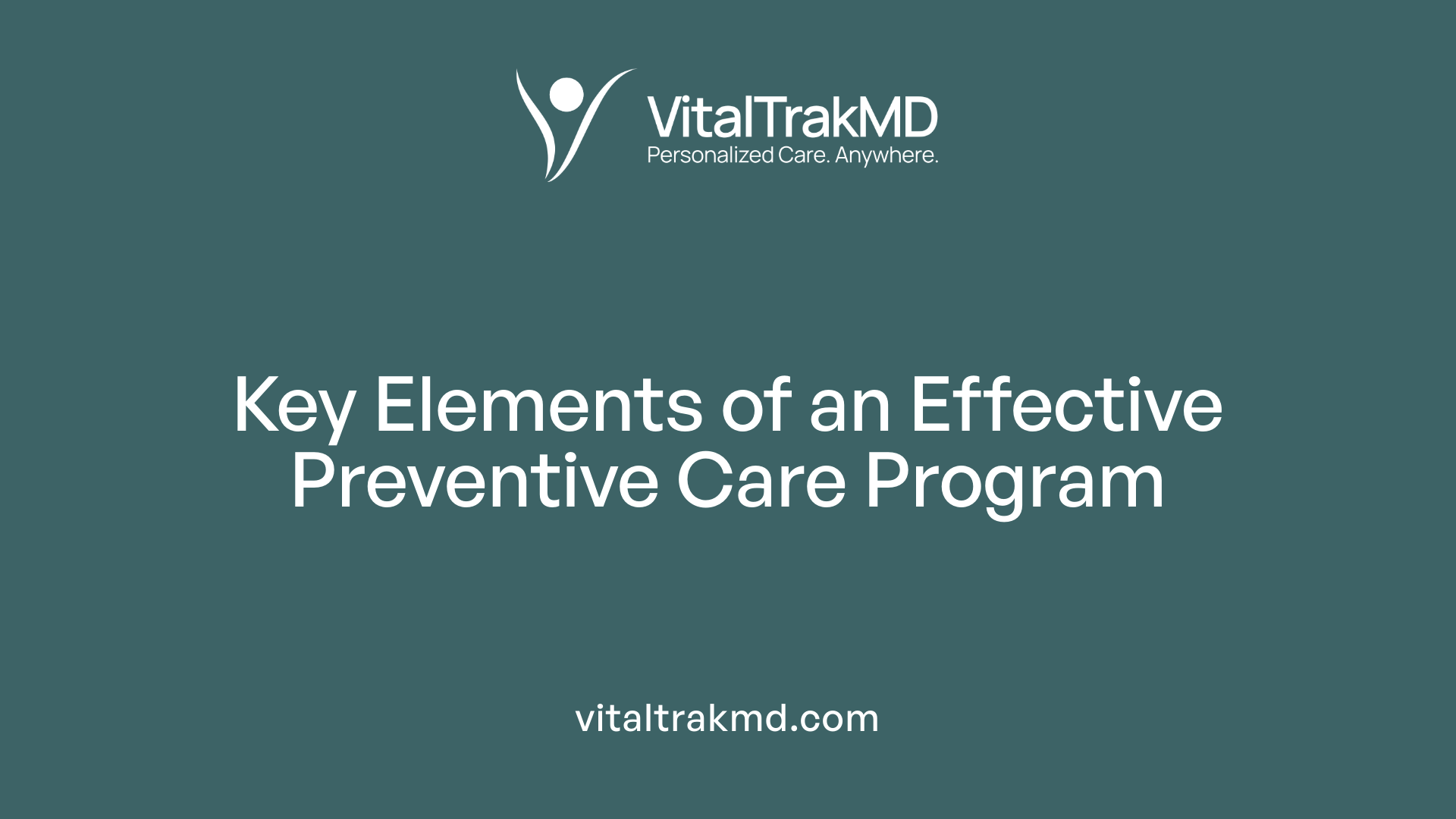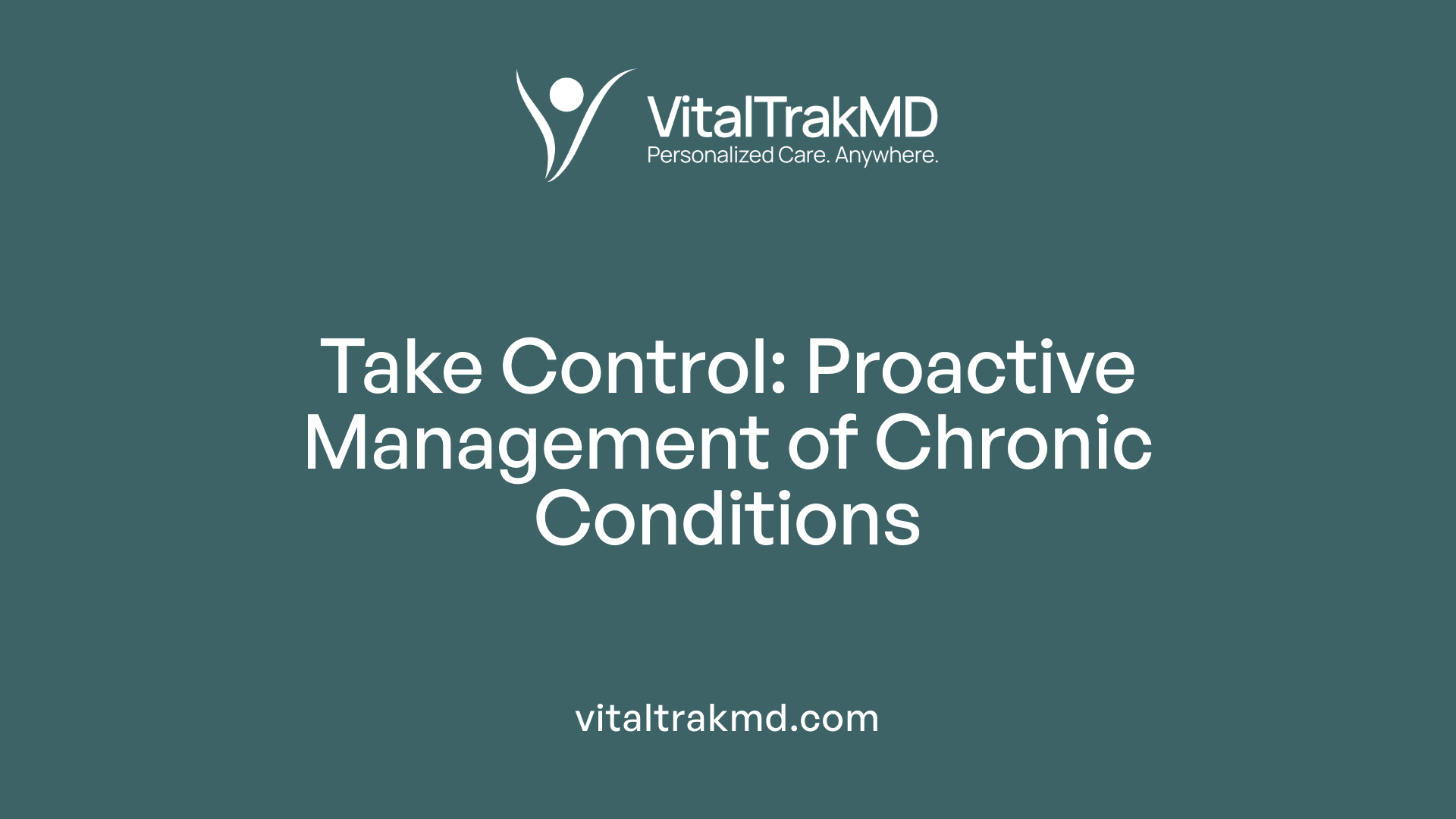Building a Preventive Care Plan with VitalTrak

A New Approach to Preventive Care with VitalTrak
Developing an effective preventive care plan is fundamental for maintaining long-term health, managing chronic conditions, and reducing healthcare costs. Incorporating innovative tools like VitalTrak can streamline this process, making personalized care more accessible and efficient. This article explores how VitalTrak supports building comprehensive preventive care strategies while highlighting best practices, the benefits of such plans, and insights from trustworthy health management approaches.
Understanding Preventive Care Planning
What is a preventive care plan?
A preventive care plan is a structured approach to maintaining health and preventing illness through regular and targeted health services. It involves routine activities such as annual check-ups, immunizations, screenings, and health assessments designed to catch potential problems early or prevent them altogether.
These plans include screenings for conditions like breast, cervical, and colorectal cancers, as well as assessments for chronic diseases such as diabetes, hypertension, and heart disease. They also encompass lifestyle guidance on diet, exercise, smoking cessation, and mental health support.
Most health insurance policies are required to cover preventive services without extra charges when delivered by in-network providers. This coverage ensures that individuals can access essential health screenings and immunizations at minimal or no cost.
Implementing a preventive care plan helps individuals stay healthier over their lifespans, reduces the chances of developing serious health conditions, and decreases long-term healthcare expenses.
Activities involved in preventive care such as check-ups, screenings, vaccinations, lifestyle guidance
Preventive care involves multiple activities aimed at early detection and health promotion. Key activities include:
- Regular check-ups: These include physical exams, review of health history, and vital sign assessments performed by primary care providers.
- Screenings: Tests such as blood pressure measurement, blood cholesterol, blood sugar (A1c), and age-appropriate cancer screenings like mammograms, Pap smears, and colonoscopies.
- Vaccinations: Immunizations like flu shots, shingles, pneumococcal vaccines, and Tdap protect against infectious diseases.
- Lifestyle guidance: Discussions on diet, exercise, alcohol use, smoking cessation, mental health, and stress management help promote healthy habits.
These activities are customized based on age, gender, medical history, and lifestyle, ensuring that each individual receives appropriate preventive services.
Role of health insurance in covering preventive services
Health insurance plays a vital role by covering most preventive services at no cost to the patient. Under federal regulations, plans are required to cover an array of preventive services without copayments or deductibles when provided by in-network providers.
Coverage typically includes screenings for various cancers, lifestyle counseling, immunizations, and health assessments. This policy encourages proactive health management, reduces barriers to preventive care, and leads to earlier detection of health issues.
By promoting access to these services, health insurance helps lower the incidence of advanced diseases, minimizes hospitalizations, and ultimately reduces overall healthcare spending.
Importance of personalized risk assessment by primary care providers
Primary care providers play a crucial role by performing personalized risk assessments. They evaluate factors such as age, gender, family history, genetics, lifestyle, and existing health conditions.
This assessment guides the creation of a customized preventive care plan tailored to each individual’s unique needs.
For example, a patient with a family history of prostate cancer may begin screening earlier, while another with lifestyle risk factors might receive targeted lifestyle counseling.
Personalized risk assessments enable more effective prevention strategies, improve health outcomes, and foster stronger patient-provider relationships. Regular communication and updates ensure the care plan adapts as health status evolves.
| Aspect | Details | Additional Notes |
|---|---|---|
| Definition | Structured health maintenance plan focusing on prevention | Entire framework to keep individuals healthy |
| Activities | Check-ups, screenings, vaccinations, lifestyle counseling | Tailored to age, gender, risk factors |
| Insurance Role | Covers preventive services with no cost | Reduces barriers and promotes utilization |
| Provider Role | Conducts risk assessments and guides personalized plans | Ensures early detection and effective prevention |
Emphasizing these elements helps in fostering a culture of proactive health management and long-term wellness.
Core Components of a Preventive Care Strategy

What is a preventive care plan?
A preventive care plan is a structured approach to maintaining health and preventing diseases before they become serious health problems. It involves regular visits to healthcare providers for check-ups, vaccinations, screening tests, and lifestyle counseling. These activities are designed to catch health issues early, promote healthier habits, and reduce the need for more intensive treatments later.
Most health insurance plans provide coverage for preventive services at no extra cost, provided the services are performed by in-network providers. This makes it easier for individuals to access essential health examinations and screenings, such as mammograms, colonoscopies, and blood pressure checks.
Creating and following a personalized preventive care plan helps individuals stay on top of their health, identify potential risks early, and make informed decisions about lifestyle adjustments. Personalized plans typically consider age, medical history, family history, and lifestyle factors, ensuring targeted prevention strategies.
A primary care provider plays a crucial role in guiding patients through this process, recommending appropriate tests and interventions based on individual needs and risk factors. By actively engaging in preventive care, individuals can improve their quality of life, reduce long-term healthcare costs, and enjoy peace of mind.
Regular check-ups and physical exams
Regular check-ups are foundational to any preventive care strategy. During these visits, healthcare providers assess overall health status, update medical histories, and perform physical examinations. These exams allow for the early detection of health problems such as hypertension, obesity, or signs of chronic conditions like diabetes or heart disease.
Physical exams typically include vital sign measurements like blood pressure, heart rate, height, weight, and assessments of BMI. Additional tests or screenings may be recommended based on age, gender, and medical history. For example, women are encouraged to undergo mammograms and Pap smears, while men may need prostate screenings.
These routine visits are also an opportunity for patients to discuss health concerns, receive immunizations, and receive counseling on lifestyle factors such as nutrition, exercise, smoking cessation, and stress management. Establishing a relationship with a healthcare provider during check-ups ensures personalized care and ongoing health monitoring.
Screenings for early disease detection, such as blood pressure, blood glucose, cholesterol, and cancer screenings
Screenings are vital for detecting health issues at an early stage when they are most treatable. Common screenings include blood pressure measurements to identify hypertension, which can lead to severe heart and kidney problems if untreated.
Blood glucose tests help identify prediabetes or diabetes, conditions that can be managed or reversed with early intervention. Cholesterol tests reveal the risk for cardiovascular disease, prompting lifestyle changes or medications to lower risks.
Cancer screenings, such as mammograms for breast cancer, Pap smears for cervical cancer, and colonoscopies for colorectal cancer, enable early detection, which greatly improves treatment outcomes. The timing and frequency of these screenings vary based on age, gender, and personal risk factors.
Other tests like blood tests for liver and kidney function, and assessments for osteoporosis or infectious diseases like hepatitis and HIV, are part of comprehensive preventive strategies. Implementing these screenings as recommended by healthcare providers enhances early diagnosis and timely treatment.
| Screening Type | Recommended Age/Group | Purpose | Additional Details |
|---|---|---|---|
| Blood Pressure | All adults | Detect hypertension | Monitored regularly, especially in older adults |
| Blood Glucose | Adults over 45 or earlier for high risk | Detect prediabetes/diabetes | A1c test provides detailed insights |
| Cholesterol | Starting at age 20, more frequent after 45 | Assess cardiovascular risk | Includes LDL, HDL, and triglycerides |
| Mammogram | Women aged 40+ | Early breast cancer detection | Annually or biennially based on risk |
| Pap Smear | Women aged 21-65 | Cervical cancer screening | Every 3-5 years depending on age and previous results |
| Colorectal Cancer Screening | Starting at age 45 | Detect early signs of colon cancer | Includes stool tests, sigmoidoscopies, or colonoscopies |
Enhancing preventive care adherence
To make preventive care effective, it is essential to encourage regular participation through patient education, flexible scheduling options like telehealth and after-hours appointments, and regular reminders. Building a strong relationship between patients and providers increases trust and motivation.
Offering tailored services such as personalized health assessments and lifestyle coaching further improves adherence. Patients who perceive real value and understand their health risks are more likely to engage consistently in preventive activities.
In summary, an effective preventive care strategy combines regular check-ups, comprehensive screenings, personalized approaches, and ongoing communication. These efforts build a proactive health culture, resulting in better long-term health outcomes and reduced healthcare costs.
Leveraging VitalTrak for Personalized Preventive Care

What is a preventive care plan?
A preventive care plan is a tailored approach to health management that focuses on regular services for early detection and prevention of serious diseases. These plans typically include an array of activities such as annual check-ups, vaccinations, screenings for cancers (like mammograms and colorectal tests), and lifestyle counseling.
Most health insurance policies are mandated to cover preventive services when performed by in-network providers, which makes access easier and more affordable. By engaging in these activities, individuals can maintain optimal health, catch potential health issues early, and significantly lower the risk of developing chronic and costly conditions later.
A primary care provider can tailor specific tests and services based on an individual’s age, medical history, lifestyle, and risk factors, ensuring that the preventive care plan is customized and effective.
Utilizing VitalTrak tools to develop personalized health or pet care plans
VitalTrak offers advanced tools that facilitate the creation of highly personalized care plans.
These tools enable healthcare and veterinary providers to gather detailed health histories, lifestyle data, and risk factors from their patients or pets.
With this information, providers can develop comprehensive, individualized plans that include routine screenings, vaccinations, and management strategies suited to the specific needs of each patient or animal.
For pet care, VitalTrak helps define wellness routines encompassing breed-specific needs, age-appropriate screenings, and dietary considerations.
In human health, the platform supports digital health records, immunization tracking, and alert systems for upcoming tests or check-ups.
By leveraging this technology, providers can promote proactive health behaviors and ensure ongoing adherence to recommended health routines.
Integration of VitalTrak into existing wellness routines
Seamless integration of VitalTrak into daily and periodic wellness routines maximizes the benefits of preventive care.
Practitioners can embed VitalTrak’s functionalities into electronic health record (EHR) systems or wellness platforms, allowing for automatic updates of patient or pet data and scheduling reminders.
Patients or pet owners receive timely notifications for upcoming screenings, vaccination renewals, or wellness visits, encouraging consistent engagement.
The system also tracks completed activities, provides educational content, and offers tailored health tips, supporting sustained motivation.
This digital integration reduces the frequency of missed appointments and keeps health management at the forefront of daily routines.
Customizing screening schedules based on individual risk factors
A cornerstone of effective preventive care, customized screening schedules consider personal health history, age, genetics, lifestyle, and environmental factors.
For instance, individuals with a family history of cancer might start screenings earlier or undergo additional genetic testing.
Similarly, pets with predispositions for specific illnesses, such as hip dysplasia in certain breeds, can have tailored screening and early intervention plans.
VitalTrak’s sophisticated algorithms analyze these personalized data points to recommend optimal timing for screenings like blood pressure, cholesterol, cancer tests, and other diagnostics.
The platform’s flexibility ensures that health plans adapt over time as risk profiles change, maintaining relevance and efficacy.
| Aspect | Benefit | Example |
|---|---|---|
| Personalized risk assessment | Ensures tailored screening and prevention | Early colonoscopy for patients with family history |
| Automated alerts | Keeps patients/pets on schedule | Reminders for annual vaccines |
| Data integration | Coordinates care across providers | Central record of all screenings and immunizations |
| Flexibility | Adapts to changing health status | Updating screening frequency after new diagnosis |
By incorporating these features, VitalTrak enhances the efficiency and precision of preventive care management, benefiting both practitioners and the individuals or pets they serve.
Implementing Effective Preventive Care Routines with VitalTrak

What is a preventive care plan?
A preventive care plan is a structured approach to maintaining health and preventing disease through routine health services. It encompasses annual check-ups, screenings, immunizations, and lifestyle counseling designed to catch illnesses early or avoid them altogether. Most health insurance policies are mandated to cover these services at no extra charge when provided by in-network providers.
The benefits of such plans include early detection of conditions like cancer, diabetes, and heart disease, which can significantly improve treatment outcomes. Additionally, preventive care reduces long-term healthcare costs by addressing health issues before they escalate.
Healthcare providers tailor these plans based on individual factors such as age, family history, gender, and lifestyle. Determining the right screenings—such as mammograms, colonoscopies, or blood pressure checks—is essential for effective health management.
Steps for creating an effective preventive care plan using VitalTrak
Implementing a successful preventive care routine involves specific, actionable steps with tools like VitalTrak. First, healthcare providers perform a comprehensive health assessment during initial visits, which includes reviewing medical history, current health status, and personal risk factors.
Using VitalTrak, clinicians can input detailed health data and set personalized goals for each patient. This digital platform helps to identify recommended screenings based on guidelines and individual risk profiles.
Creating a tailored plan involves selecting appropriate services such as immunizations, blood tests, and specialist referrals. It is crucial to prioritize these activities within a timeline aligned with age and health status.
Regular monitoring through VitalTrak allows tracking of health metrics over time, ensuring that the patient stays on schedule for upcoming screenings and appointments. It also facilitates timely updates to the care plan as new health concerns or risk factors emerge.
Automation features in VitalTrak can send reminders for upcoming appointments, follow-up tests, and healthy lifestyle activities, enhancing overall adherence.
Monitoring health data and adjusting plans accordingly
Continual monitoring is vital for maintaining an effective preventive care routine. VitalTrak aggregates health data such as blood pressure, cholesterol levels, blood sugar, and BMI measurements from various sources.
By analyzing trends over time, clinicians can identify early warning signs of developing conditions. For example, rising blood pressure readings may prompt medication adjustments or lifestyle counseling.
Furthermore, if risk factors like family history or new symptoms arise, the care plan can be adapted quickly to include additional screenings or referrals.
Using real-time data and analytics, healthcare teams can make evidence-based decisions to optimize health outcomes. Patients benefit from personalized care that evolves with their changing health status.
Enhancing plan adherence through regular communication and appointment pre-booking
One of the biggest challenges in preventive care is ensuring patients follow through with recommended services. Regular communication plays a crucial role.
VitalTrak's automated messaging system can send appointment reminders, health tips, and motivational messages to encourage ongoing engagement.
Pre-booking appointments during upcoming visits or through patient portals makes it easier for clients to schedule necessary tests and check-ups ahead of time, reducing missed appointments.
Providing educational resources about the importance of each screening and lifestyle modification fosters understanding and commitment.
Additionally, offering flexible scheduling options, including telehealth consultations, ensures accessibility and convenience.
By integrating consistent communication and pre-booking strategies, veterinary practices can significantly improve adherence to care plans, leading to better health outcomes and higher client satisfaction.
| Aspect | Strategy | Benefit |
|---|---|---|
| Personalization | Tailoring health goals with VitalTrak | Increased relevance and motivation |
| Monitoring | Regular data analysis | Early detection and intervention |
| Engagement | Automated reminders and education | Higher adherence and trust |
| Accessibility | Pre-booking and telehealth options | Improved participation and continuity |
Implementing these approaches with VitalTrak not only streamlines preventive care but also enhances client engagement, retention, and overall practice revenue.
Supporting Long-Term Health with Preventive Strategies

What is a preventive care plan?
A preventive care plan is a proactive approach to maintaining health and avoiding future illnesses by providing regular health services. These plans include scheduled check-ups, vaccinations, screenings, and lifestyle counseling aimed at early detection and disease prevention. For example, annual exams often involve blood pressure measurement, cholesterol testing, cancer screenings like mammograms or colonoscopies, and assessments for chronic conditions such as diabetes or hypertension.
Most health insurance policies are mandated to cover these services at no additional cost when delivered by in-network providers. The goal is to help individuals identify health issues early when they are most treatable, thereby reducing the need for extensive treatments later.
Healthcare providers play a crucial role in tailoring a preventive care plan that suits an individual’s unique health profile. They consider factors such as age, gender, medical history, and lifestyle to recommend appropriate tests and ongoing health strategies. For instance, starting prostate cancer screenings earlier for Black men or monitoring blood sugar levels for pre-diabetics can significantly influence health outcomes.
By committing to a personalized preventive care routine, individuals can experience long-term benefits, including maintaining a better quality of life, reducing healthcare costs, and managing chronic conditions effectively. Building consistent health habits with regular visits encourages a strong relationship with healthcare providers, which enhances personalized care and ongoing support.
Overall, a well-structured preventive care plan acts as a foundation for healthier aging, early disease detection, and sustained well-being.
How regular health maintenance helps avoid chronic illnesses
Regular health maintenance is vital in preventing and managing chronic illnesses such as diabetes, heart disease, arthritis, and certain cancers.
Routine check-ups facilitate early diagnosis through screenings like blood pressure monitoring, blood tests for cholesterol and glucose levels, and cancer screenings such as mammograms or colonoscopies. Early detection often leads to less intensive treatment and better health outcomes.
For example, managing hypertension effectively during regular visits prevents complications like stroke or kidney disease. Similarly, monitoring blood sugar levels helps control diabetes progression, reducing the risk of complications like diabetic retinopathy or nerve damage.
Preventive strategies also include lifestyle modifications—encouraging balanced diets, physical activity, smoking cessation, and moderation of alcohol intake. These habits diminish the risk of developing chronic conditions in the first place.
Healthcare providers often discuss lifestyle factors during visits, guiding patients on healthier choices tailored to their personal and family health risks.
Furthermore, vaccinations against diseases like influenza and pneumonia protect vulnerable populations from severe infections that could exacerbate existing health issues.
Long-term health trajectories improve significantly when individuals adhere to regular health maintenance routines. This approach not only prevents illness but also enables early intervention, which is crucial for maintaining function and independence as people age.
Strategies to enhance long-term health through preventive care
Achieving sustained health requires integrating preventive care into everyday life. Here are some practical strategies:
- Pre-Book Appointments: Scheduling regular check-ups ahead of time ensures ongoing engagement with healthcare providers.
- Staying Informed: Educating oneself about recommended screenings and health milestones based on age and risk factors guarantees timely interventions.
- Utilizing Telehealth Services: Virtual visits provide convenient access to primary care, especially for routine consultations or minor health concerns.
- Personalizing Health Goals: Developing individualized wellness plans that consider personal health history increases motivation and adherence.
- Fostering Healthy Habits: Incorporating daily physical activity, nutritious diets, and stress management techniques sustains overall well-being.
- Building Healthcare Relationships: Maintaining ongoing relationships with trusted providers encourages honest dialogue and customized care.
Organizations like Wellstar and Covetrus exemplify these strategies by offering programs that promote preventive care, from screenings to lifestyle modification support.
How healthcare organizations support preventive care
Innovative health organizations have developed comprehensive programs to promote long-term health.
For instance, Covetrus offers CarePlans—a management solution designed to make pet preventive care plans easy and attractive, reducing cancellations and promoting ongoing health monitoring.
Similarly, organizations like Wellstar emphasize annual wellness exams that include screenings for blood pressure, cholesterol, cancers, and metabolic conditions. These exams aim to detect issues early and guide preventive interventions.
Public health initiatives like Men’s Health Month serve to raise awareness and motivate routine health check-ups.
Moreover, coordinated programs such as asthma management and colorectal cancer screening campaigns address specific health concerns by providing education, at-home testing options, and targeted outreach.
By implementing these initiatives, health organizations foster a culture of prevention that benefits entire communities and individual lives.
Summtable of preventive services and screenings
| Service / Screening | Recommended Age / Population | Purpose | Additional Notes |
|---|---|---|---|
| Blood pressure check | Annually for most adults | Detect hypertension | Essential for heart health |
| Cholesterol test | Every 4-6 years for adults | Assess cardiovascular risk | More frequent for high-risk individuals |
| Blood glucose | Every 3 years or as diabetes risk | Detect diabetes or prediabetes | Critical for early intervention |
| Mammogram | Starting at age 40 annually | Breast cancer screening | More frequent for high-risk groups |
| Colorectal cancer screening | Starting at age 45 | Early detection of cancer | Options include colonoscopy or FIT kit |
| Prostate screening | Age 45-50 for at-risk men | Detect prostate issues early | Personalized based on risk factors |
| STI screening | Annually or as advised | Prevent sexually transmitted infections | Targeted based on sexual activity |
| Vaccinations | Adult vaccines (flu, shingles, pneumococcal) | Prevent infectious diseases | Recommended starting at age 19 |
| Bone density scan | Postmenopausal women, age 65+ | Detect osteoporosis | More frequent if needed |
| Vision & hearing tests | Regular intervals | Early detection of sensory decline | Age and risk-based |
Building a health-conscious future
Integrating preventive health strategies into daily routines ensures long-lasting benefits. Regular screenings, healthy lifestyle habits, professional healthcare relationships, and organizational support all contribute to a healthier, more fulfilling life.
Whether managing personal health or caring for pets and community members, proactive prevention remains the strongest tool for aging well and avoiding avoidable illnesses.
Managing Health Conditions Proactively

What is a preventive care plan?
A preventive care plan encompasses a series of health services aimed at early detection or prevention of serious diseases. It involves routine activities like annual check-ups, immunizations, and screenings for cancers and chronic conditions, alongside promoting healthy lifestyle choices.
Most health insurance plans are mandated to cover these services at no extra cost when they are performed by in-network providers. This approach helps individuals maintain good health, identify issues early, and avoid costly treatments later on.
Healthcare providers assess each patient’s unique risk factors such as age, gender, medical history, and lifestyle to recommend tailored preventive services. These plans typically include regular screenings like mammograms, colonoscopies, blood pressure checks, and blood tests like cholesterol and blood glucose levels.
Research demonstrates that well-structured preventive care can significantly reduce the risk of developing severe health conditions, including diabetes, hypertension, cancers, and chronic respiratory illnesses. Moreover, early intervention strategies in preventive care involve managing symptoms before they escalate into complex health problems.
Screening and management of chronic conditions like diabetes, asthma, arthritis
Managing chronic illnesses proactively involves continuous monitoring, early detection of exacerbations, and personalized lifestyle modifications.
For diabetes, regular blood glucose testing, A1c assessments, and eye exams are critical. Controlling blood sugar levels can prevent complications such as nerve damage, kidney disease, and vision loss.
Asthma management relies on regular assessment of lung functions, identification of triggers, and personalized medication plans. Education about inhaler techniques and avoiding triggers like allergens and pollution can significantly improve quality of life.
Arthritis management includes routine evaluations to monitor joint health, pain levels, and mobility. Incorporating physical therapy, medication adjustments, and lifestyle changes like weight management helps in controlling symptoms and preventing further joint damage.
A comprehensive approach combines medication adherence, lifestyle modifications, and regular health tracking through tools like VitalTrak, which records vital signs, medication routines, and symptom patterns.
Table 1: Common Chronic Conditions and Management Strategies
| Condition | Key Monitoring Tests | Management Focus | Additional Support |
|---|---|---|---|
| Diabetes | A1c, blood glucose, eye exams | Blood sugar control, diet, exercise | Education on self-management, technology aids |
| Asthma | Lung function tests, symptom diary | Trigger avoidance, inhaler techniques | Personalized action plan, regular reviews |
| Arthritis | X-rays, joint exams, mobility assessments | Pain management, physical therapy | Weight control, exercise, anti-inflammatory medications |
Ongoing management benefits from health tracking devices and regular communication with healthcare teams. Virtual consultations, digital health records, and personalized care adjustments form part of an effective chronic condition management plan.
Importance of Building a Proactive Health Relationship
Developing a strong relationship with healthcare providers facilitates personalized care and encourages adherence to management plans. Regular check-ups serve not only as disease monitors but also as avenues for lifestyle counseling and mental health support.
In summary, managing health conditions proactively through tailored screening and ongoing management greatly enhances long-term health outcomes. Employing comprehensive strategies—integrating medication, lifestyle modifications, and technology—can help patients live healthier, more comfortable lives while reducing healthcare costs.
A Path Forward for Proactive Health Management
Building a comprehensive preventive care plan with VitalTrak empowers individuals to take control of their health. By integrating routine screenings, personalized risk assessments, and ongoing health monitoring into daily wellness practices, patients can achieve better health outcomes, detect issues early, and reduce long-term healthcare costs. As healthcare continues to evolve, digital tools like VitalTrak are playing an increasingly vital role in making preventive care accessible, tailored, and effective, fostering a healthier future for all.
References
- Care plans renewal strategy: Understanding churn and how to deal ...
- Preventive Care 101: The Importance of Regular Check-Ups
- Make Your Preventative Care a Priority - Wellstar
- Preventive Care & Annual Wellness Visits - Complete Health
- Preventive-Services - Health Plan of Nevada
- Out-of-Pocket Estimates for Preventive Health Care - MUSC Health
- Men's Health Month: Men Should Prioritize Preventive Care
- How Your Primary Care Doctor Keeps You Healthy with Preventive ...
Recent articles
Want to Feel Better and Live Healthier?
Join hundreds of patients taking control of their health with personalized care that fits their life – not the other way around.
Rated 4.8/5 by 32+ customers







